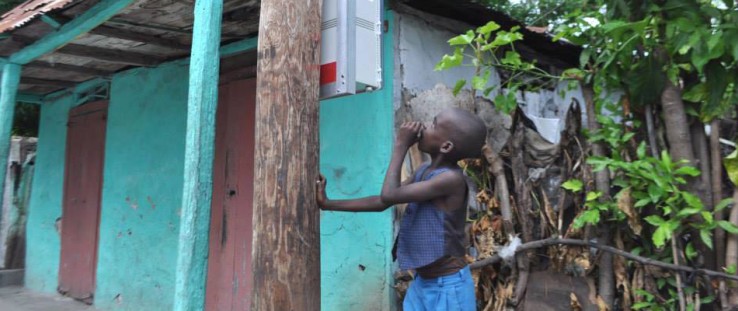 A Haitian boy inspects the installation of an early-stage microgrid meter box.
EarthSpark International
A Haitian boy inspects the installation of an early-stage microgrid meter box.
EarthSpark International
 A Haitian boy inspects the installation of an early-stage microgrid meter box.
EarthSpark International
A Haitian boy inspects the installation of an early-stage microgrid meter box.
EarthSpark International
Working in Boston in 2008, Dan Schnitzer received an unexpected email from a New York-based Haitian diaspora organization called Comité de Relèvement des Anglais. Group members had read about his energy work and wanted to collaborate with him to bring energy to their community back in Haiti.
For years, their town of Les Anglais, located near the tip of Haiti’s southwest peninsula, shut down at sunset because the only light available came from kerosene lamps, candles and fires. Families that couldn’t afford candles or fuel sat in darkness. The organization’s members knew that the solutions were out there and that they just had to find an individual or organization that could deliver them.
That initial discussion with the diaspora association and subsequent trips to Haiti led Schnitzer to create EarthSpark International—and its subsequent brand Enèji Pwòp, or clean energy in Haitian Creole. The nonprofit, whose donors include the United Nations Foundation, the U.N. Environment Program and National Geographic, is dedicated to providing clean, reliable energy access to communities such as Les Anglais and the hundreds of small, rural communities across Haiti that are not reached by the country’s energy utility Electricité d’Haïti. It was formed to not only reduce energy poverty, but also to ensure people were offered true energy access—power that is both available and affordable.
These days, Schnitzer, who serves as executive director, co-runs the organization with Allison Archambault. “We build value chains that bridge the gulf between the community and their access to energy,” offering them not only light but also the power needed to run local businesses, says Archambault, EarthSpark’s president.
The community of Les Anglais embraced EarthSpark’s efforts. Working with the diaspora organization that originally contacted Schnitzer, EarthSpark helped a local community group open an Enèji Pwòp clean energy store in 2010, selling technologies such as solar lights and more efficient clean cookstoves. The products range from $11 for a small solar-powered light or efficient cookstove to several hundred dollars for a solar home system. The store’s e-commerce site targeted at diaspora showcases all the current products.
Each of the products pays for itself in just a matter of months when compared to what customers would have spent on kerosene, candles or battery charging. For example, an $11 efficient cookstove saves 25 cents in charcoal per day compared to the typical Haitian stoves that burn charcoal less efficiently. Enèji Pwòp also sells a kerosene cookstove that completely displaces charcoal.
The store filled the community’s most pressing energy needs and the operation grew rapidly. By 2012, EarthSpark had sold more than 7,000 products. In the first nine months of 2013 alone, sales exceeded 3,000. Today, EarthSpark has 102 local, clean energy entrepreneurs who sell solar lights and clean energy cookstoves across Haiti.
In 2012, EarthSpark further expanded energy access in Les Anglais by turning on Haiti’s first pre-pay microgrid. The tiny pilot grid initially served just 14 households, later expanding to 54 customers. Since the launch of the initial pilot, EarthSpark has been working to expand the microgrid, add solar energy, and unlock uses for electricity, including in the key sector of agriculture. EarthSpark discovered the Powering Agriculture program at the perfect moment.
Powering Agriculture: An Energy Grand Challenge for Development—a partnership between USAID, the Governments of Sweden and Germany, Duke Energy and the Overseas Private Investment Corporation—was designed to support new and sustainable market-based, clean energy solutions that increase agricultural productivity in developing countries. The partners have committed $50 million to support these efforts, and supported 11 projects through their first call for proposals in early 2013. A second call for proposals is expected in September 2014.
EarthSpark applied for and received $1 million from Powering Agriculture to support this latest effort in Les Anglais.
EarthSpark sees its role as an incubator of sorts. It identifies energy needs, creates companies that meet those needs, and tests and refines those companies to ensure that they can ultimately function in a marketplace. Once they achieve commercial viability, EarthSpark spins them off and undertakes new challenges.
That’s the goal in working with Les Anglais’ agricultural processors. Millers and other processors can’t grow their businesses because of inefficient equipment that runs on costly fuels. Crops like breadfruit, rice, sorghum, coffee and corn are plentiful in the area, but diesel-based mills are sooty and expensive to operate. Moreover, breadfruit rots quickly without any processing.
One of the agricultural processors poised to be a microgrid customer, Julio Francois, spent 10 years driving taxis in New York City and came back to his hometown of Les Anglais to build a business. He knew there was great potential in the small agricultural town. He also knew there were challenges. Beyond the paved road, Les Anglais is cut off from the rest of Haiti when the river rises. Transportation is expensive and infrastructure scarce.
Nevertheless, Francois purchased two local diesel mills that are situated right across from the big market on Wednesday, when he has lines out the door. Farmers bring their grains to him for milling, then sell them in the market.
“I have been thinking about solar energy,” said Francois. “My head is full with the problems of running the diesel generators. So many problems!” Francois will be a key customer in EarthSpark International's grid expansion.
EarthSpark believes that, if it can help these agricultural processors access efficient equipment and affordable, clean energy, then it could unlock untapped agricultural wealth in the area for the existing businesses, create new industries, and establish anchor customers for their growing grid.
“So often development is halted and extreme poverty entrenched because of what can seem like insurmountable barriers, but we know that all of these barriers can be leap-frogged with the right solutions,” said Eric G. Postel, head of USAID’s Bureau for Economic Growth, Education and Environment, as he spoke about the larger Grand Challenge for Development effort. “EarthSpark shows what determination, innovation and community engagement can do to transform lives and achieve lasting economic development. We are happy to help them take the next step forward and bring energy innovations to agriculture in Haiti.”
Sowing Seeds
Archambault and Schnitzer firmly believe in the value of leapfrogging to efficient, clean energy systems in places that currently lack grids, but when they initially tried to build a smart grid—which uses digital technology to read usage and deliver power—in Les Anglais, they found that low-cost, high-functioning meters did not exist. They worked with engineering volunteers to design and hand-build smart meters that could minimize operating costs and maximize use of renewable energy on the grid by using pre-pay meters with networked communications. Fifty-four such meters have been working in Les Anglais since late last year.
Archambault sees Powering Agriculture’s role in Les Anglais as about more than just supporting EarthSpark. To her, the funds provided by the Powering Agriculture program create an opportunity to “de-risk” future investments in the microgrid and agricultural sectors.
“There are a lot of unknowns and a lot of risk when you are working in new business models in rural communities in the developing world,” she said. “It doesn’t mean there isn’t a lot of opportunity, but it does mean that, through this award, the Powering Agriculture partners are leading the way forward and clearing a path for future companies to join in EarthSpark’s efforts.”
In her view, communities gaining access to affordable, local, sustainable clean energy solutions is a “great outcome and a great way to leverage public funds,” she said, adding that she is proud that Powering Agriculture chose EarthSpark to help lead the way.
“There are more than 100 towns in Haiti that currently lack electricity but could be good candidates for solar smart grids,” Archambault says. EarthSpark is focusing on expanding the Les Anglais grid, but already mayors of other towns are inquiring about when EarthSpark will come to their town.
EarthSpark believes the first rung on the ladder toward energy access and economic opportunity is solar lights and clean cookstoves. Access to these technologies allows children to complete school work at night, businesses to stay open later, and families to live in homes that are free from deadly fumes and the costs of traditional fuels. And in a country like Haiti where the monthly per capita income is a little over $100 and fuel for lamps and stoves can cost over $20 a month, efficient stoves and solar technology can transform lives.
With the launch of the initial microgrid in 2012, the organization moved up to the proverbial second rung of the energy access ladder, supplying the community with reliable electricity that not only turns on lights but also powers small and large appliances and machines.
M. Julio St. Fort, one of EarthSpark’s customers, talks about the success and potential of EarthSpark this way: “Many people have said they would bring electricity to Les Anglais. Enèji Pwòp is the group that has actually done it. I am extremely satisfied with Enèji Pwòp service in my home, and I encourage others to sign up as soon as service is available to them.”
Jean Noel Paget, a Les Anglais community leader who helped guide Schnitzer’s initial visit, said that, “With electricity, people breathe better. They can use radios and charge their cell phones. It is a revolution that will happen. It’s a new way of thinking; a new way for people to function.”







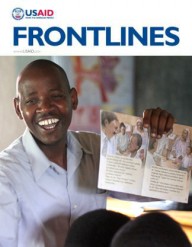



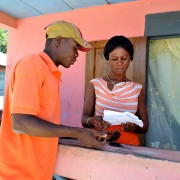
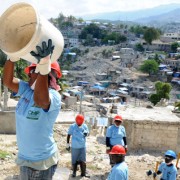
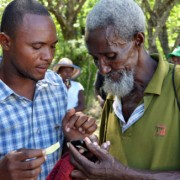
Comment
Make a general inquiry or suggest an improvement.